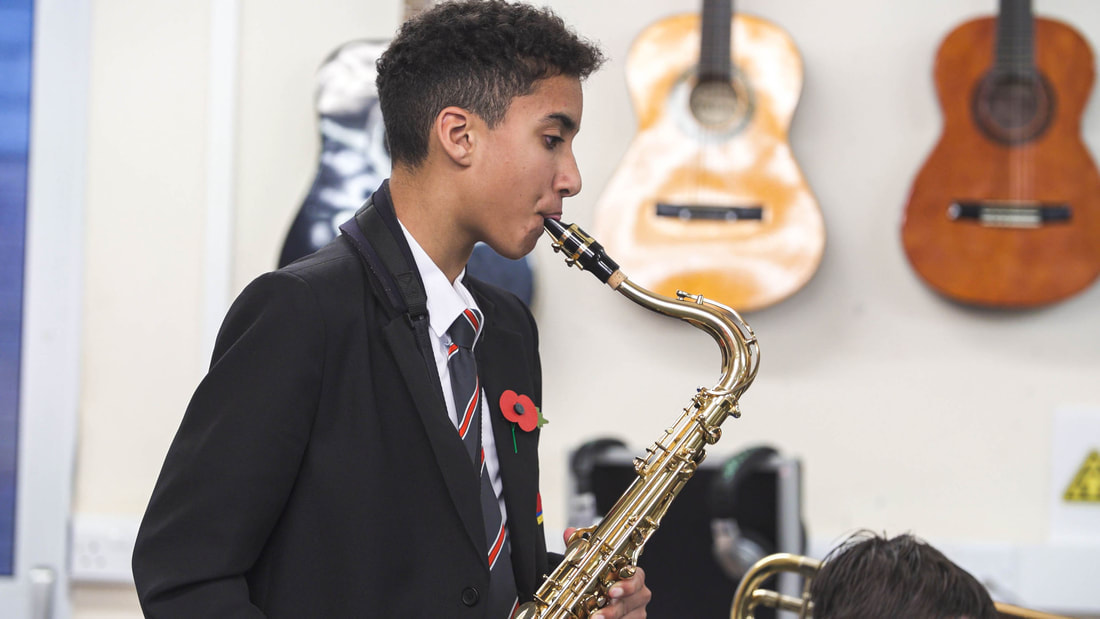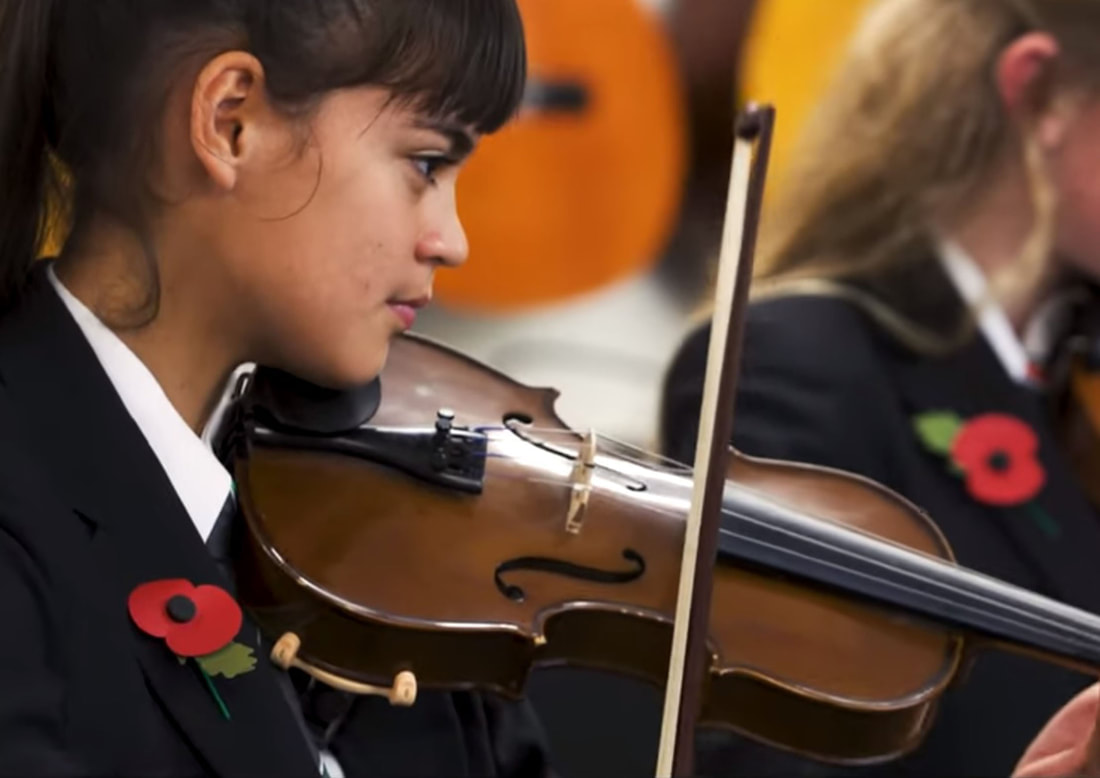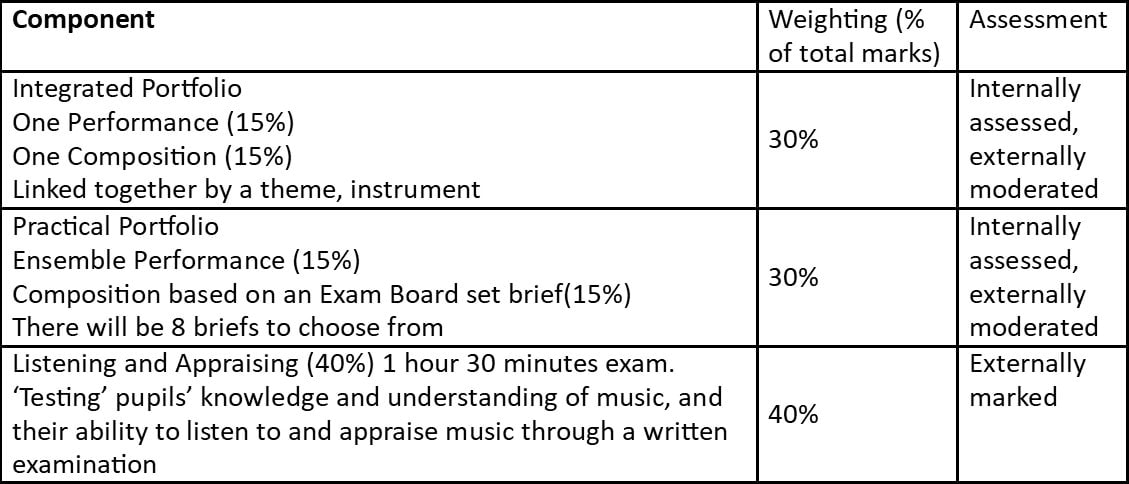Music Department IntentAs you arrive in the music department from the top of the stairs, a quote from Professor Graham Welch from the UCL Institute of Education greets you in a floor to ceiling graphic that declares: “We are all musical, we just need the opportunity”. The curriculum intent for music is simply the realisation and application of this maxim, and can be summed up as follows: The curriculum for music assumes the inherent musicality of every child and primarily seeks to train children to explore and recognise this too, in themselves and others. …or to put it in a more succinct, student-centred form: You are musical. Let’s prove it. Key stage 3
Music is taught in a purpose built classroom. There is a wide selection of electric bass guitars, acoustic guitars, electric guitars, keyboards, pianos, a range of percussion and two drum kits.
Instrumental lessons are also available from our team of visiting peripatetic teachers. Instruments covered include:
What do students study? Music is taught as part of the Core Curriculum at Key Stage 3. Every student in Years 7, 8 and 9 has a one hour lesson per week. High standards of work are expected and students develop self-awareness and self-confidence in an environment where success is recognised and valued. At KS3 lessons are heavily practical and involve a variety of stimulus material. All topics include Performing, Composing, Listening and commenting on Music. Lessons are delivered using the various resources available. All students develop performance skills using voice, Guitar, Keyboard and Percussion. In Year 7, Students study a Bridging Unit, Keyboard Skills, Boomwhacker Project, BBC Ten Pieces Project, Mediterranean Music and Summertime Guitar project. Building on the skills and knowledge established in Year 7, students continue to use a range of instruments in Year 8 , including voice, to study Communicating Music, Tchaikovsky and the Romantic Concerto, Blues Music, 50s and 60s Rock ‘n; Roll, Minimalism and Solo Artists. In Year 9, students begin to cover more areas from the GCSE Syllabus. Music projects in Year 9 include; My Music (an opportunity for students to focus on a performer or composer of their choice), Film and Game Music, Pop Ballads, Rock Anthems of the 70s and 80s, Indian Classical Music and Bhangra and Musicals. How are students assessed? Students are assessed using the Sidmouth College Route system. Each project is assessed either by the Teacher, peer or self-assessed (or a combination of all three). Assessments are recorded in a booklet designed by the Music department to keep a record of listening work, composition work, as well as the end of project assessment. Key stage 4
WHO IS THIS COURSE FOR?
This course will suit students who enjoy performing, composing and learning about a wide range of musical genres. It would also suit musicians who have taken graded exams (ABRSM) (Rock School). You should be prepared to become involved in Extra Curricula Music at School or in the Community. Prerequisites for the course
EXAM BOARD, COURSE CONTENT & ASSESSMENT DETAILS We will be studying GCSE Music with OCR The course consists of five Areas of Study:
WHAT CAN THIS COURSE LEAD TO POST 16? A level Music and other Music qualifications. FOR WHAT CAREERS WILL THIS COURSE BE USEFUL? There are many careers where the skills learned through studying Music can be applied; Ability to work with others (ensemble skills), the ability to work on your own (solo performance), the ability to be focused and self-motivated (practise), an ability to show empathy (studying Music you wouldn’t normally listen to), creativity (composition skills), following a brief (coursework). More obvious choices include; Education (Classroom Teaching, Peripatetic Teaching, Music Department Technician), Community Musician, Composer (Film Music and Game Music is a growing Sector), Sound Engineer (Live and/or Studio), Copywriter, Music Publisher, Music Journalist, Military Band Member, Songwriter, Performer, Youth Work, Music Therapist All careers in the music and recording sector. Comments are closed.
|
Access Octomono Masonry Settings
Subjects
All
|
- Home
-
About Us
- About our School
- Board of Governors
- Careers & Education Guidance
- Contact
- Equality
- Ethos and Values
- Exam Results >
- Hire of School Premises
- Links & Partnerships
- Ofsted Reports
- Our People
- Performance Data
- Policies
- Principal's Welcome
- Pupil Premium
- SEF & College Priorities
- Sidmouth College Way
- Ted Wragg Trust
- Vacancies
- Visitor Information
- Wellbeing at School
- Admissions
- Learning
-
Parents
-
Students
- Sixth Form
Useful links |
Navigate |
|
© Sidmouth College 2020 | Primley Road, Sidmouth, Devon EX10 9LG | Website design by Bright Blue C











